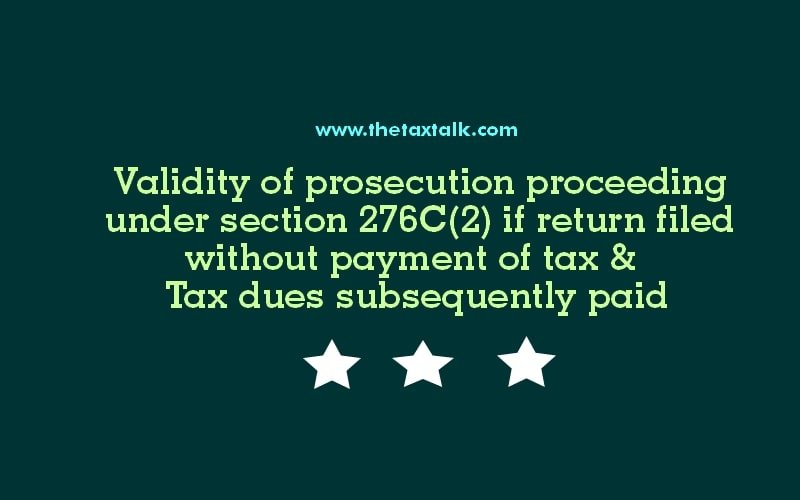![]()
Validity of prosecution proceeding under section 276C(2) if return filed without payment of tax & Tax dues subsequently paid
Short Overview It was admitted in the counter-affidavit itself that the assessee had cleared the dues and as on date no tax dues were payable in respect of previous financial years. Inasmuch as the tax has been subsequently paid, continuance of the impugned prosecution under section 276C(2) would only amount to an abuse of legal process.
Assessee had filed their income-tax return in time admitting their liability. But, then the tax was not remitted in time. There was delay. The question that arose for consideration was whether this would amount to a willful evasion attracting the penal provisions and offence under section 276C(2).
It is held that It was admitted in the counter affidavit itself that the assessee had cleared the dues and as on date, no tax dues were payable in respect of previous financial years. Inasmuch as the tax has been subsequently paid, continuance of the impugned prosecution would only amount to an abuse of legal process. Following the judgment in M/s. Vyalikaval House Building Co-operative Society Ltd. 2019 TaxPub(DT) 5379 (Karn-HC) the impugned proceedings were quashed.
Decision: In assessee’s favour.
Followed: Vyalikaval House Building Co-operative Society Ltd. 2019 TaxPub(DT) 5379 (Karn-HC)
IN THE MADRAS HIGH COURT
G.R. SWAMINATHAN, J.
Bejan Singh Eye Hospital (P) Ltd. v. Income Tax Department
Crl. O.P. (MD) No. 13383 of 2019 and Crl. M.P. (MD) Nos. 8303 and 8304 of 2019
12 March, 2020
Petitioners by: Ashok Padmaraj
Respondent by: S. Srimathy, Senior Standing Counsel
ORDER
This criminal original petition has been filed to quashing the proceedings in C.C. No. 425 of 2019 on the file of learned Additional Chief Judicial Magistrate, Madurai. The petitioners are facing trial for the offences under sections 276C(2) of the Income Tax Act.
2. The learned standing counsel appearing for the respondent strongly opposed the prayer for quashing. A detailed counter affidavit has also been filed.
3. The petitioner’s counsel reiterated the contentions set out in the memorandum of grounds.
4. I carefully considered the rival contentions and went through the materials on record, particularly the counter affidavit as well as the impugned complaint. It is not in dispute that the first petitioner is an assessee under Income Tax Act and the petitioners 2 and 3 are its Managing Director and Director respectively. The issue concerns the financial year 2011-12 to 2014-15. It is not in dispute that the petitioners had filed their income tax return in time admitting their liability. But then the tax was not remitted in time. There was delay.
The question that arises for my consideration is whether this will amount a wilful evasion attracting the aforesaid penal provisions.
5. The issue is no longer res integra. The learned counsel appearing for the petitioner drew my attention to the decision made by the Hon’ble Karnataka High Court in Crl. P. No. 4891 of 2014, dated 14-6-2019. The Hon’ble Karnataka High Court in the aforesaid decision held as follows :–
“In the instant case, the only circumstance relied on by the respondent in support of the charge levelled against the petitioners is that, even though accused filed the returns, yet, it failed to pay the self-assessment tax along with the returns. This circumstance even if accepted as true, the same does not constitute the offence under section 276C(2) of the Act. The act of filing the returns by itself cannot be construed as an attempt to evade tax, rather the submission of the returns would suggest that petitioner No. 1 had voluntarily declared his intention to pay tax. The act of submitting returns is not connected with the evasion of tax. It is only an act which is closely connected with the intended crime, that can be construed as an act in attempt of the intended offence. In the backdrop of this legal principle, the Hon’ble Supreme Court in the case of Prem Dass v. Income Tax Officer cited supra, has held that a positive act on the part of the accused is required to be established to bring home the charge against the accused for the offence under section 276C(2) of the Act.”
6. It is admitted in the counter affidavit itself that the petitioner have since cleared the dues and as on date no tax dues are payable in respect of the aforesaid financial years. Inasmuch as the tax has been subsequently paid, I am of the view that continuance of the impugned prosecution would only amount to an abuse of legal process.
Respectfully following the judgment of the Hon’ble Karnataka High Court, the impugned proceedings stand quashed and the criminal original petition is allowed. Consequently, connected miscellaneous petitions are closed.


